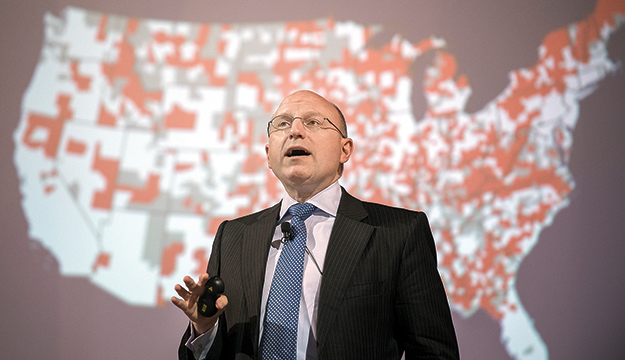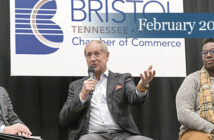Stephen Moret outlines his economic agenda for Southwest Virginia at the SWVA Economic Forum, May 10. Photos by Tim Cox Photo/Graphics
By Scott Robertson
Stephen Moret brought a simple message to the SWVA Economic Forum at UVa-Wise May 10: Southwest Virginia no longer ends at Roanoke in the minds of the Commonwealth’s economic development partnership. Moret, who was named the VEDP’s CEO last November, outlined a six-point plan for addressing Southwest Virginia’s economic challenges as part of a broader set of goals for the state.
Moret laid part of the blame for the loss of jobs and population in Southwest Virginia at Richmond’s feet. The state has been “quiet” in economic development competition for the last few years, he said, which has been just fine for areas like Newport News and Northern Virginia, but has ill-served rural communities.
“Rural Virginia is competing with places like South Carolina, Georgia and Mississippi,” Moret said, “places that have been much more aggressive in the last few years than we have. The most important thing I can do this year is to answer the question, ‘What will it take to make ALL of Virginia grow? What will it take to make Southwest Virginia actually experience population growth?’”
The region is expected to continue to lose population over the next 10 years. “The best data we have available shows that Southwest Virginia will lose close to 1,000 people a year,” Moret said. “Obviously there are huge implications for that. How do we turn that around?
“If we were to add just 250 direct jobs per year, those would result in about 500 total jobs in support services, health care, retail and other areas. Virginia has about two people for every job we have. So in order to avoid losing 1,000 people per year, we need an additional 250 direct jobs per year over and above what the region is producing. Yes, it’s a challenge. Yes, we are facing competition nationally. But this is something we can achieve. But we need the Commonwealth of Virginia to play its part and to play its part better than we have in the past.”
Moret laid out a six-point plan to begin to accomplish
that goal:
1. Create a world-class, turn-key, customized workforce development program for competitive economic development projects.
2. Dramatically expand computer science and related programs at UVa-Wise and other higher education institutions.
3. Adopt policy changes to address Virginia’s uncompetitive state/local tax environment for new, capital-intensive manufacturing projects.
4. Develop a job-creation payroll credit with higher incentive values for projects developed in rural areas.
5. Brand rural Virginia as the most attractive location in the U.S. for manufacturing, lower-cost software development, business process outsourcing and data centers.
6. Catalyze one or more high-quality, mixed-use developments that would be attractive to young professionals.
“These are by no means the only things that will make a difference,” Moret said, reiterating the VEDC’s commitment to improve its efficiency in bringing new opportunities to the region. “If you look at the rankings by site selection consultants nationally in statewide workforce development programs, Virginia is not in the top three, we’re not in the top five, we’re not even in the top 10 in this space. If we were to launch a program like this we could go to the top five in three years and even the top three in five years. It would make a profound difference in economic development in rural Virginia and Southwest Virginia in particular.”
When asked about leveraging cross-border synergies, especially with businesses that operate in both Northeast Tennessee and Southwest Virginia, Moret was enthused. He pointed out the fact that state officials from the northern and eastern parts of Virginia have complained about difficulty of travelling to Southwest Virginia by air when the Tri-Cities Airport was readily available for commercial flights. “So one very simple thing we’re going to do is start using Tri-Cities Airport when we have things in Southwest Virginia so we give a better feel for the real transportation opportunities throughout the region.
“We need to do a better job of being open to the reality that some of these economic development wins are going to be multi-state wins and take advantage of the fact that all of that workforce is out there,” Moret added. “In getting the general assembly to get past their sensitivity to that fact, we just need to focus on how much of the workforce is likely to come from Virginia and how much is likely to come from outside Virginia. ”




